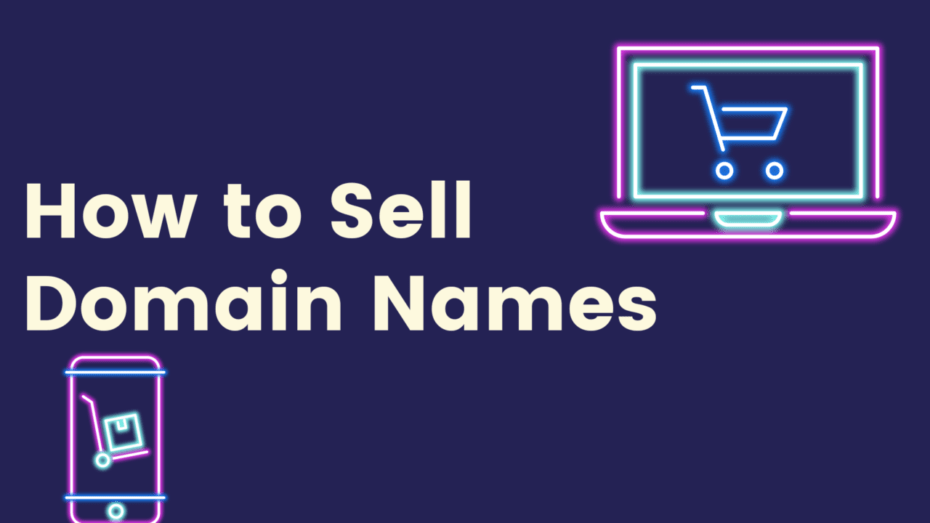Table of Contents
Sell domain names!? Selling domain names can be a lucrative venture, allowing you to generate significant income online. By understanding the intricacies of domain trading, you can unlock the full potential of your domain portfolio.
I believe it’s essential to grasp the value of good domain names and learn effective strategies to market them successfully. In this section, we’ll explore why selling domain names might be your next big income stream and provide valuable insights into the domain trading basics.
Why Selling Domain Names Could Be Your Next Big Income Stream
Selling domain names offers a fantastic opportunity to earn money online. The digital real estate market is booming, with businesses and individuals constantly seeking unique and memorable domain names.
I recommend exploring this market because it requires relatively low investment compared to other ventures. Most importantly, you can start with just a few domains and gradually build your portfolio.
I advise you to keep an eye on emerging trends and industries, as they often demand new domain names. By staying ahead of the curve, you can acquire domains that will be highly sought after in the future. Additionally, my suggestion is to focus on brandable and keyword-rich domains, as they tend to attract more buyers and fetch higher prices.
To maximize your success, I strongly believe in leveraging various domain marketplaces and auction sites. These platforms can provide you with a broader audience, increasing the likelihood of a sale.
I recommend you to utilize social media and online communities to market your domains effectively. By engaging with potential buyers, you can showcase the value and potential of your domains, ultimately driving more interest and higher bids.
Understanding the Value of a Good Domain Name
A good domain name is a valuable asset in the digital world. It serves as the online identity of a business, making it crucial for branding and marketing efforts. I suggest focusing on domain names that are short, memorable, and easy to spell. These characteristics make them more attractive to potential buyers, increasing their market value.
I advise you to consider the SEO aspects of a domain name. Keyword-rich domains can improve a website’s search engine ranking, driving more organic traffic. I point out that domains related to trending topics or emerging industries are often in high demand. By identifying these trends early, you can acquire domains that will appreciate in value over time.
My recommendation is to use domain appraisal tools to assess the value of your domains. These tools consider various factors such as length, keyword relevance, and market demand. By understanding the potential worth of your domains, you can price them competitively, attracting serious buyers.
Furthermore, I believe that investing in premium domains can yield substantial returns. These domains are often more expensive to acquire but can sell for significantly higher prices. My advice is to diversify your portfolio with a mix of both premium and brandable domains to maximize your income potential.
The Basics of Domain Trading: What You Need to Know
Domain trading involves buying and selling domain names for profit. It’s a straightforward process, but I recommend familiarizing yourself with the basics to succeed in this market. First, I suggest registering domains through reputable registrars to ensure their legitimacy and security.
I believe in conducting thorough research before purchasing any domain. Look into the domain’s history, previous ownership, and any associated trademarks. This due diligence can prevent potential legal issues and ensure you’re investing in valuable assets. My advice is to use tools like WHOIS and domain auction sites to gather this information.
When it comes to selling your domains, I recommend listing them on multiple marketplaces to reach a wider audience. Platforms like Sedo, Flippa, and GoDaddy Auctions are popular choices among domain traders. By diversifying your sales channels, you can increase the chances of finding the right buyer at the right price.
Lastly, I strongly believe in building relationships within the domain trading community. Networking with other domain traders can provide valuable insights, tips, and opportunities for collaboration. By staying active in forums and attending industry events, you can learn from experienced traders and stay updated on market trends, ultimately enhancing your trading strategy.
Essential Strategies to Successfully Sell Domain Names
Selling domain names effectively requires strategic planning and a deep understanding of the market. My recommendation is to focus on identifying high-demand domains, leveraging SEO tools for value assessment, and pricing your domains competitively. By implementing these strategies, you can increase your chances of making profitable sales and optimizing your domain portfolio’s value.
I advise you to stay updated with market trends and industry news. This will help you spot opportunities for acquiring and selling domains at the right time. Additionally, networking with other domain traders and participating in online communities can provide valuable insights and tips to enhance your strategies.
Identify High-Demand Domains for More Profitable Sales
Identifying high-demand domains is crucial for maximizing your profits. I suggest conducting thorough market research to understand what types of domains are currently in demand. Look for emerging trends, popular keywords, and niche markets that may require new domain names. By staying ahead of the curve, you can acquire domains that will be highly sought after in the future.
I believe that focusing on brandable domains can be particularly profitable. These domains are easy to remember, pronounce, and spell, making them attractive to businesses looking to establish a strong online presence. My advice is to avoid overly complex or long domains, as they are less likely to appeal to buyers.
Additionally, I recommend using domain marketplace tools to analyze sales data and identify patterns. Platforms like NameBio provide historical sales data that can give you insights into which domains have sold for high prices. By understanding these trends, you can make informed decisions about which domains to invest in.
Lastly, I advise you to keep an eye on expired domains. These domains can often be purchased at a lower cost and may already have established traffic or backlinks, increasing their value. By monitoring expired domain lists, you can find hidden gems that can be resold for a profit.
Leveraging SEO Tools to Assess Domain Value
Leveraging SEO tools is essential for accurately assessing the value of your domains. I recommend using tools like Moz, SEMrush, and Sitechecker to analyze keyword popularity, search volume, and competition. These tools can help you understand the potential traffic a domain can generate, which is a key factor in its value.
My suggestion is to pay attention to domain authority (DA) and page authority (PA) metrics. High DA and PA scores indicate that a domain has strong backlink profiles and can rank well in search engine results. I point out that domains with existing backlinks from reputable sites are generally more valuable.
I believe it’s important to consider the commercial intent of keywords associated with your domain. Domains that include keywords with high commercial intent are more likely to attract buyers willing to pay a premium. I advise you to focus on domains that target keywords with high conversion rates, as these are highly desirable to businesses.
Another recommendation is to use Google Trends to analyze the popularity of keywords over time. This tool can help you identify rising trends and seasonal keywords, allowing you to invest in domains that will gain value in the future. By leveraging these SEO tools, you can make data-driven decisions and maximize the profitability of your domain sales.
Tips for Pricing Your Domains Competitively
Pricing your domains competitively is essential for attracting buyers and closing sales. I suggest starting with a thorough appraisal of your domains using tools like Estibot and GoDaddy’s domain appraisal service. These tools provide estimates based on various factors, including keyword relevance, search volume, and historical sales data.
I advise you to research similar domains currently on the market to understand the going rates. This will help you set a competitive price that aligns with market expectations. My recommendation is to consider offering flexible pricing options, such as payment plans or lease-to-own agreements, to appeal to a broader range of buyers.
When setting your prices, I believe it’s important to factor in the cost of renewal fees and any marketing expenses you incur. Ensure your pricing strategy covers these costs while still offering good value to potential buyers. I would say that transparency about these costs can build trust and facilitate smoother negotiations.
Lastly, I suggest creating compelling domain listings that highlight the unique value and potential of each domain. Include relevant statistics, such as search volume and traffic estimates, to justify your asking price. By clearly communicating the benefits and value of your domains, you can attract serious buyers and achieve successful sales.
Marketing Your Domains: Techniques That Attract Buyers
Effectively marketing your domains is crucial to attract potential buyers and achieve successful sales. I recommend focusing on crafting compelling listings and leveraging social media to broaden your reach. Additionally, actively participating in domain forums and online communities can provide valuable exposure and networking opportunities.
To maximize your success, my advice is to use a multi-faceted approach that combines different marketing strategies. This will help you reach a diverse audience and increase the likelihood of finding the right buyer for your domains. By following these techniques, you can enhance the visibility and attractiveness of your domain portfolio.
Crafting Compelling Listings to Showcase Domain Potential
Creating compelling listings is essential to showcase the potential of your domains and attract buyers. I suggest writing clear, concise descriptions that highlight the unique features and benefits of each domain. Emphasize aspects such as brandability, keyword relevance, and potential for high traffic to make your listings stand out.
I advise you to include data-driven insights in your descriptions, such as search volume and SEO metrics. This information can demonstrate the value of your domains and justify your asking price. Additionally, using high-quality visuals, such as logos or website mockups, can help buyers envision the domain’s potential use.
My recommendation is to optimize your listings with relevant keywords without overloading them. This approach ensures that your listings are easily discoverable by search engines and potential buyers. I point out that using bullet points and headings can make your listings more readable and appealing.
Furthermore, I suggest providing clear and transparent information about pricing and payment options. Offer flexible terms, such as installment plans or lease-to-own agreements, to attract a wider range of buyers. By presenting your domains professionally and informatively, you can increase your chances of making a sale.
Utilizing Social Media to Reach a Wider Audience
Leveraging social media is an effective way to reach a broader audience and market your domains. I recommend creating dedicated social media profiles for your domain portfolio on platforms like Twitter, LinkedIn, and Facebook. Share regular updates, domain listings, and industry news to engage with potential buyers and build a following.
I believe that using targeted ads on social media can help you reach specific demographics interested in your domains. Platforms like Facebook and LinkedIn offer advanced targeting options, allowing you to focus on users based on interests, job titles, and other criteria. My advice is to experiment with different ad formats, such as carousel ads and video ads, to see what resonates best with your audience.
Engaging with industry influencers and joining relevant groups on social media can also enhance your reach. I suggest participating in discussions, sharing valuable insights, and promoting your domains subtly within these communities. By building relationships with influencers, you can leverage their networks to gain more exposure for your domains.
Lastly, I recommend using social media analytics tools to track the performance of your marketing efforts. Analyzing metrics like engagement, reach, and click-through rates can help you refine your strategy and optimize your campaigns for better results. By utilizing social media effectively, you can significantly increase the visibility of your domains.
Networking in Domain Forums and Online Communities
Networking in domain forums and online communities is a powerful way to market your domains and connect with potential buyers. I suggest joining popular domain trading forums like NamePros and DNForum, where you can engage with other traders, share insights, and list your domains for sale.
I advise you to participate actively in discussions and contribute valuable information to establish yourself as a knowledgeable and trustworthy member of the community. Most importantly, avoid spamming or overly self-promotional posts, as this can harm your reputation and deter potential buyers.
My recommendation is to use your forum signature to promote your domains subtly. Include a link to your portfolio or specific listings, along with a brief description. This passive promotion method can attract interest without being intrusive. I point out that many forums have dedicated sections for buying and selling domains, so take advantage of these spaces to showcase your listings.
Additionally, I believe that attending virtual conferences and webinars hosted by these communities can provide valuable networking opportunities. Engage with speakers and participants, ask questions, and share your experiences to build connections. By networking effectively, you can gain insights, find potential buyers, and stay updated on industry trends.
Lastly, I suggest joining niche-specific communities related to the types of domains you are selling. For example, if you have domains related to technology, join tech forums and groups. By targeting relevant communities, you can increase the chances of finding interested buyers who see the value in your domains.
Navigating Legal Considerations in Domain Sales
When selling domain names, navigating legal considerations is crucial to ensure smooth and secure transactions. I advise you to understand the legal framework governing domain sales and to be aware of common pitfalls that could jeopardize your deals. By prioritizing legal compliance, you can protect your interests and those of your buyers.
My recommendation is to familiarize yourself with the regulations and best practices related to domain transactions. This will not only safeguard your business but also build trust with potential buyers, enhancing your reputation in the market. Understanding the legal landscape is essential for anyone looking to sell domain names successfully.
Understanding the Legal Framework for Selling Domains
Understanding the legal framework for selling domains is essential for any domain trader. I advise you to start by researching the policies set by the Internet Corporation for Assigned Names and Numbers (ICANN), as they govern the domain registration and transfer process globally. Compliance with ICANN rules ensures that your transactions are legitimate and recognized internationally.
My recommendation is to also familiarize yourself with trademark laws. Selling a domain that infringes on a trademark can lead to legal disputes and financial losses. I believe it’s crucial to conduct thorough due diligence to ensure that your domain names do not violate existing trademarks. Tools like the United States Patent and Trademark Office (USPTO) database can be helpful for this purpose.
I point out that it’s important to have a clear and binding sales agreement. This document should outline the terms of the sale, including payment details, transfer procedures, and any warranties or guarantees. I suggest consulting with a legal expert to draft this agreement to ensure it covers all necessary aspects and protects both parties involved.
Lastly, I recommend staying updated on any changes in domain-related regulations. The digital landscape is constantly evolving, and new laws can impact how domains are bought and sold. By keeping abreast of these changes, you can adapt your strategies and remain compliant with all legal requirements.
Avoiding Common Legal Pitfalls in Domain Transactions
Avoiding common legal pitfalls is vital to ensuring successful domain transactions. One major issue is failing to verify the ownership of a domain before attempting to sell it. I advise you to always confirm that the domain is registered in your name and that there are no disputes or claims against it. This verification can prevent future legal complications.
Another common pitfall is not being aware of the buyer’s intentions. I suggest thoroughly vetting potential buyers to ensure they have legitimate reasons for purchasing the domain. This can help you avoid situations where the domain is used for unlawful activities, which could bring legal repercussions back to you as the seller.
I recommend using an escrow service for domain sales. An escrow service acts as a neutral third party that holds the buyer’s funds until the domain transfer is successfully completed. This protects both parties and ensures that the transaction is conducted fairly. My advice is to choose a reputable escrow service to handle your domain sales.
Lastly, I believe it’s crucial to be transparent about any potential issues with the domain. If there are any existing disputes, liens, or claims, disclose this information to the buyer upfront. Transparency builds trust and can prevent legal disputes down the line. I strongly believe that honesty and clear communication are key to avoiding legal pitfalls in domain transactions.
The Importance of a Secure Transfer Process
Ensuring a secure transfer process is paramount when selling domain names. I recommend using a trusted domain registrar for the transfer to guarantee that the process adheres to industry standards and protects both parties involved. A secure transfer process minimizes the risk of fraud and ensures that the domain is successfully moved to the buyer’s account.
My suggestion is to follow the registrar’s transfer protocols carefully. Each registrar has specific procedures for transferring domains, and adhering to these guidelines can prevent errors and delays. I point out that confirming the buyer’s contact information and ensuring it matches the registrar’s records is a crucial step in this process.
I advise you to keep detailed records of the transaction, including all communications and confirmation emails. These records can serve as proof of the transfer and provide a reference in case any issues arise later. Documentation is an essential aspect of maintaining transparency and accountability in domain sales.
Finally, I recommend notifying the buyer once the transfer is complete and providing them with any necessary information for managing their new domain. This final step ensures a smooth transition and reinforces your professionalism and commitment to customer satisfaction. By prioritizing a secure transfer process, you can enhance your reputation and ensure the successful sale of your domains.
Conclusion: Maximizing Your Earnings from Domain Sales
Maximizing your earnings from domain sales involves a combination of strategic planning, market understanding, and continuous learning. I advise you to focus on acquiring high-value domains, utilizing effective marketing techniques, and staying updated with industry trends. By following these strategies, you can enhance your chances of selling domains at profitable prices.
I believe that building a diverse portfolio with a mix of premium and niche domains is key to attracting a wide range of buyers. My suggestion is to remain proactive and adapt to the evolving domain market to capitalize on emerging opportunities. This approach will help you achieve sustained success in your domain selling endeavors.
Review of Key Takeaways for Selling Domains
Reviewing the key takeaways for selling domains can help solidify your understanding and strategy. I recommend starting with thorough research to identify high-demand domains. Focus on brandable and keyword-rich domains that appeal to businesses and individuals alike. This foundational step is crucial for building a valuable domain portfolio.
My advice is to leverage SEO tools to assess the value of your domains accurately. Tools like Moz and SEMrush can provide insights into keyword popularity and domain authority, helping you price your domains competitively. I suggest regularly checking these metrics to stay informed about your domains’ market value.
I point out that crafting compelling domain listings is essential for attracting buyers. Highlight the unique features and potential benefits of each domain, and include data-driven insights to justify your asking price. Using high-quality visuals and clear descriptions can make your listings more appealing and effective.
Lastly, I recommend utilizing multiple marketing channels to reach a broader audience. Social media, domain marketplaces, and networking in online communities can significantly increase your exposure. By employing a multifaceted marketing approach, you can enhance your chances of finding the right buyer for your domains.
Planning Your Next Steps in the Domain Selling Journey
Planning your next steps in the domain selling journey involves setting clear goals and developing a strategic roadmap. I advise you to start by analyzing your current domain portfolio to identify strengths and areas for improvement. Determine which domains are high-value and which may need more marketing efforts.
I suggest creating a detailed plan for acquiring new domains. Research emerging trends and industries to identify potential opportunities. My recommendation is to set a budget for domain purchases and prioritize acquiring domains with high commercial potential. This proactive approach will help you stay ahead in the competitive domain market.
I believe it’s important to continuously refine your marketing strategies. Evaluate the performance of your current marketing efforts and explore new channels to reach potential buyers. I would say that experimenting with different platforms and techniques can help you discover what works best for your domains.
Finally, I recommend networking with other domain traders and participating in industry events. Engaging with the community can provide valuable insights and opportunities for collaboration. By building strong connections, you can enhance your knowledge and stay updated on market trends, ultimately improving your domain selling strategy.
Continuous Learning and Adaptation in the Domain Market
Continuous learning and adaptation are crucial for long-term success in the domain market. I strongly believe that staying informed about industry trends and technological advancements can give you a competitive edge. Regularly reading industry blogs, attending webinars, and participating in forums can help you stay updated.
I advise you to invest in your education by taking courses on domain trading and digital marketing. Understanding the latest SEO techniques and marketing strategies can improve your ability to sell domains effectively. My suggestion is to seek mentorship from experienced domain traders who can provide guidance and insights.
I point out that monitoring your performance metrics is essential for continuous improvement. Use analytics tools to track your sales, marketing efforts, and overall portfolio performance. By analyzing this data, you can identify patterns and areas for enhancement, allowing you to adapt your strategies accordingly.
Lastly, I recommend being flexible and open to change. The domain market is dynamic, and what works today may not work tomorrow. I advise you to regularly review and adjust your strategies to align with the evolving market conditions. By embracing continuous learning and adaptation, you can maximize your earnings and achieve sustained success in the domain selling business.






